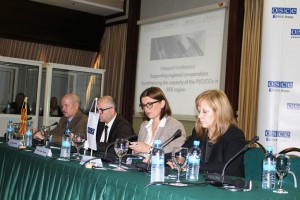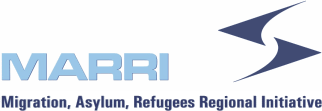 The project „Supporting the development and sustainable operation of regional cooperation mechanism by means of enhancing the capacity of Police Custom Cooperation Centres in South Eastern European region” has been launched during the two days Conference held on 25th- 26th October 2016 in Skopje. The event was organised by OSCE.
The project „Supporting the development and sustainable operation of regional cooperation mechanism by means of enhancing the capacity of Police Custom Cooperation Centres in South Eastern European region” has been launched during the two days Conference held on 25th- 26th October 2016 in Skopje. The event was organised by OSCE.
The Transnational Threats Department/Border Security and Management Unit (TNTD/BSMU) in co-operation with the German OSCE Chairmanship-in-Office, invited the representatives of the Police Co-operation Convention in South Eastern Europe (PCC SEE) supported by DCAF Ljubljana, EUROPOL, FRONTEX, WCO, MARRI, German Federal Police, and the national experts of the other OSCE participating States experienced in the P(C)CCs implementation.
Representatives of the Border police and customs services from the Western Balkans presented current functioning of the P(C)CCs and discussed follow-up steps to be undertaken in order to improve their capacity, as key Project objective is to establish legal and technical background for data exchange among WB countries and between WB and EU countries. The expected result is establishment of systems and protocols for regional cross-border cooperation and exchange of information among border police structures and customs administrations.
Together with ambassador Ms. Nina Soumalainen, Head of OSCE Mission in Skopje, Mr. Mitko Cavkov, Public Security Bureau Director and Mr. Dennis Cosgrove, Head of Transnational Threats Department/Border Security and Management Unit at OSCE Secretariat MARRI RC Director welcomed the participants of the conference.
In her opening remarks, Ambassador Tamara Mugosa stressed the need to address migration crisis in more sustainable manner, following the principles of well-being societies. She reiterated that one of the fundamental values of these societies is social, cultural, political and economic participation of citizens, both for people born there and newcomers. „Inclusion is the key feature of these societies and states. It assumes humanity and protection of fundamental rights. This is where we need to pay attention on holistic approach to protection of these rights. We are obliged and we do believe that these rights should be provided to each and every refugee, but we should not forget that our citizens also have the same fundamental rights. This is where our common task – to protect – has the origin. All international organizations, governments, competent institutions, NGOs dealing with migration crisis need to assume that security of our societies is a precondition for all we do in crisis management, in order to offer long term and sustainable solutions to the situation we are in” – she stated.
Mugosa also pointed that this task it to be completed with joint efforts, as no stakeholder has that luxury to spend individual resources overlapping activities with other parties involved in migration crisis management. In order to succeed, international and national mechanisms and institutions need to find the way how to achieve most effective outputs, how to create synergies of their activities, whenever it is possible.
Recalling the fact that Migration, asylum and refugees’ Regional initiative (MARRI) is a single inter-governmental mechanism that deals with migration issues, as a core mandate, in the region, she stressed that police authorities represent maybe the most important target group of MARRI policies, projects and activities. In that terms, she informed on key outputs of multi-annual project BORDAIRPOL, where strategic meetings of Heads of airport and lend border police have been organized, in order to provide context for identifying common denominators of their needs and challenges, especially in the areas of information exchange and trainings, their requests to be met, in the light of EU standards. MARRI has established partnership with those regional and international mechanisms that have the same or similar tasks and aspirations, such as FRONTEX and DCAF to multiply effects and outputs of the Project.
UK funded project on establishing regional data base of interpreters for rare languages in Western Balkans has been also mentioned, as a good example of regional coordination and cooperation. The Project follow up is expected in the framework of IPA II funded Program entitled Protection Sensitive Migration management in the WB and Turkey, in partnership with EC implementing partner IOM.
In that context, Mugosa prized the organization of the conference as a valuable opportunity to discuss the policies, activities and projects aimed at supporting the development and sustainable operation of regional co-operation mechanism by means of enhancing the capacity of the P(C)CCs in SEE region, in order to explore possibilities to invest so already achieved results to assist this project – making partnerships and synergies if and wherever is possible.
